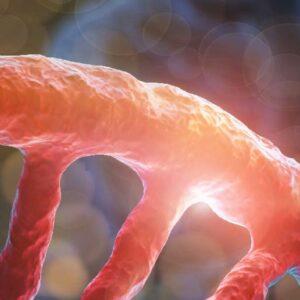OVERVIEW
Cardiovascular diseases, a group of disorders of the heart and blood vessels, are the leading cause of illness and death worldwide, responsible for 32% of all deaths globally. There are many types of hereditary cardiovascular diseases, ranging from manageable diseases to complex diseases with severe life-threatening symptoms. Overlapping symptoms can make it challenging to identify the underlying cardiovascular condition. Genetic testing can diagnose hereditary cardiovascular conditions and can also help with a differential diagnosis when necessary.
Hereditary cardiovascular diseases are caused by inherited genetic mutations (changes in the DNA that are called variants) and have a prevalence of 3% in the population. Most genetic variants causing cardiovascular conditions are passed down in an autosomal dominant pattern. Autosomal dominant pattern means that inheriting only one copy of a mutated gene from one biological parent can cause a disease. Therefore, there is a 50% chance of a child inheriting the same cardiovascular condition as the affected parent.
When someone is diagnosed with a hereditary cardiovascular disease, other close family members could benefit from genetic testing by looking for the same genetic variant, as identification prior to disease onset can lead to better clinical management.

IMPORTANCE OF GETTING TESTED
Previously, assessment of the disease risk was based on the lifestyle of an individual. The role of genetic testing is now becoming increasingly important. Cardiovascular genetic testing can detect mutations that cause cardiovascular diseases, lead to an improved prognosis and identify at-risk family members, who might be predisposed to the same hereditary cardiovascular disease. Genetic testing can also guide doctors towards an ideal treatment, help them develop a better clinical management plan and reduce the risk of sudden cardiovascular events, such as stroke or heart attack.
For high-risk asymptomatic individuals with a cardiovascular genetic variant, genetic testing can help doctors recommend appropriate examinations at key time intervals. Early intervention can be lifesaving for individuals who already developed symptoms as well as for individuals who are currently asymptomatic.
Cardiovascular genetic testing is highly recommended by professional societies such as the American College of Cardiology (ACC), American Heart Association (AHA), and the European Society of Cardiology (ESC).

WHO SHOULD TAKE THIS TEST?

You have an unidentified
cardiovascular genetic disease

You have family history of
hereditary cardiovascular disease,
sudden aortic events or sudden cardiac death

You are experiencing symptoms
(shortness of breath, excessive sweating,
heart pain, weakness, fainting or
unexplained seizures) and you think
you might have a cardiovascular-associated genetic condition

You have a clinical diagnosis of
aortic defect, irregular cardiovascular anatomy
or channelopathies (irregular heart rhythm)
You are in a high-risk group
(e.g., high cholesterol)

You have a hereditary cardiovascular
disorder and want to estimate
the risk of your children inheriting the same disorder

You need prophylactic
aortic surgery and want to
determine the right timing
TYPES OF HEREDITARY CARDIOVASCULAR DISORDERS
A group of diseases that affect the aorta, causing enlargement, dissection or aortic aneurysm that can be fatal if left untreated.
Conditions with arrhythmia as a main symptom. Arrhythmia is an irregular heartbeat (too fast or too slow) caused by changes in the electric impulses that coordinate the heartbeat.
A group of diseases of the heart muscle (myocardium). The heart muscle may become enlarged, rigid, thick, or weak reducing the efficiency of the heart to pump blood.
Defects that are present from birth and affect the heart’s structure and efficiency. Congenital heart defects can vary from mild (e.g., a small hole in the heart) to severe (e.g., missing parts of the heart).
A disorder that causes high levels of LDL cholesterol and could lead to heart disease and heart attacks if left untreated.
High blood pressure in the arteries of the lungs and the right side of the heart that can eventually lead to life-threatening complications
A group of conditions caused by mutations in the cell communication pathway, called Ras/MAPK pathway, which can lead to many symptoms including developmental syndromes, congenital heart defects, hypertrophic cardiomyopathy or other cardiovascular related conditions.
SYMPTOMS AND TREATMENT OF HEREDITARY CARDIOVASCULAR DISORDERS
SYMPTOMSSymptoms of hereditary cardiovascular diseases vary amongst affected individuals. Some people experience no symptoms, while others may experience a range of symptoms, including:
● Chest pain
● Dizziness
● Exercise intolerance
● Fainting
● Fatigue
● Heart palpitations
● Shortness of breath
Depending on the specific disease-causing genetic variant and the cardiovascular condition, a more specialized treatment plan might be suggested by the healthcare provider. Treatment of hereditary cardiovascular disease might include
● Lifestyle modifications
● Medical screenings at key time intervals
● Medication, e.g., beta-blockers, calcium channel blockers and anti-arrhythmic drugs
● Surgical intervention, e.g., pacemaker, implantable cardioverter defibrillator


MEDICAL GENETIC COUNSELLING
We provide expert medical genetic counselling as part of a genetic testing journey. Genetic counselling is a process of communication that supports patients and their relatives before and after genetic testing. It is educational, impartial and nondirective. Prior to any genetic test, genetic counsellors will obtain a detailed family history, explain the method of testing that will be used, its risks and benefits, the limitations of the diagnosis and the implications of making a genetic diagnosis (Elliott and Friedman, 2018, Nat Rev Genet 19:735).
Upon receiving the genetic test results, genetic counselling can help the specialist physician and the patient to interpret them. They can be advised of the consequences of the results including the probability of developing the genetic disorder or passing it on to children, as well as ways to prevent, avoid or reduce these risks (Yang and Kim, 2018, Ann Lab Med 38:291). Our goal of counselling is to provide the patient with greater knowledge and thus, a better understanding of the results and the ability to make a more informed decision.

Cardiac and Aortic Panels Know&Manage
● Sample can be sent to our laboratory for processing
● Exome-based technology performed via NGS. To learn more please visit our product page.
● 17 disease specific panels
● 3 comprehensive disease category panels
Learn more about Cardiac and Aortic Panels Know&Manage.
Ventrilia Cardiovascular Test
● Sample can be sent to our laboratory for processing and a TarCET IVD kit available to perform the test in your laboratory
● Proprietary target capture enrichment technology via NGS. To learn more please visit on our product page.
● 7 disease category panels
● 1 comprehensive panel (292 genes)
Learn more about Ventrilia Cardiovascular Test.
Also available as a TarCET kit. Learn more about our TarCET kits here.






















